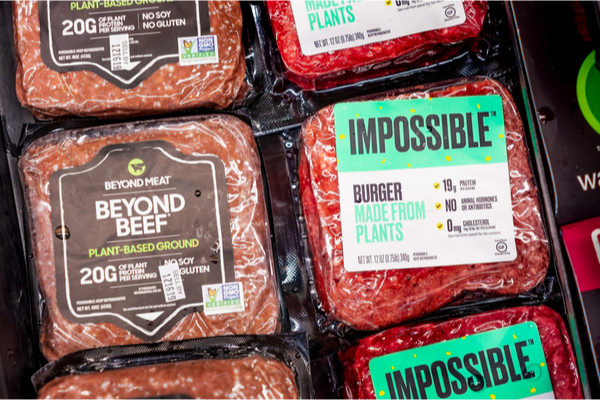Memorial Day weekend marks the official kickoff to grilling season. After a year of slaughterhouse closures due to Covid outbreaks and concerns, soaring meat prices, and increased attention to health and sustainability, the makers of plant-based meat alternatives are betting more of their products will be cooking up on grills this year. “What Covid has done is it has enabled people to briefly give some attention to where their meat comes from,” said Pat Brown, CEO and founder of Impossible Foods, makers of plant-based meat alternatives. He cited inefficient and government-subsidized production, low wages, and crowded processing lines. Along with all groceries, sales for both beef and plant-based meat alternatives shot up during the pandemic as consumers under lockdown switched to making most of their meals at home.
Meatless is definitely “having a moment.” Popular online recipe site Epicurious announced in April it would publish no new recipes containing beef, due to concerns over the cattle industry’s climate impact. Influential New York City restaurant Eleven Madison Park announced its reopening menu would be entirely plant-based, with the chef writing in a letter to customers, “the current food system is simply not sustainable.”
Once relegated to the tofu cabinet in the supermarket, meatless burgers can now be found in a special plant-based meat case in some grocery stores — in the meat section, separate, but adjacent to traditional ground beef. Even getting there took some wrangling. Plant-based meat maker Beyond Meat declined to sell to supermarkets that tucked their products away in the vegan section, according to Chuck Muth, the company’s Chief Growth Officer. Plant-based meat producers have also had to fend off the traditional agricultural industry as they fought their way into supermarkets and restaurants.
Yahoo Life reported that as the pandemic unfolded, consumers said issues at meatpacking plants were one reason they switched. “Our concern about that was of availability and prices being ridiculous, and wondering why those places were being affected by the virus so badly,” said Lisa Hartley, a 47-year-old artist who lives in upstate New York. She began cooking plant-based Gardein brand burgers for her husband and two teenage sons.
But, prices are still higher than for traditional ground beef, about $2 to $3 per pound more on average for a one-pound pack. Experts estimate that plant-based meat makers need to get within 10 percent of the price of traditional beef to get really high market penetration. Early adopters of plant-based meats say they know price will come down and availability increase as the trend catches on and the producers can expand, increasing efficiency and lowering price on volume.
Customers say the taste of the latest generation of meat-free products are virtually indistinguishable from the real thing, especially after adding a bun and condiments. “It’s got ground pieces of fat, it has things that mimic the texture,” said Josh Teder, a 26-year-old business development analyst. “It’s eerily similar [to beef], considering it’s all made from plants.” Both beef and plant-based alternatives can have similar fat and saturated fat content. To enhance flavor, plant-based meats are higher in sodium, with over 350 milligrams per serving, compared to 70 milligrams for beef. But plant-based meats have no cholesterol. Depending on what consumers are trying to limit in their diet, one choice may be better.
The makers of plant-based meats are moving to capture the spike in demand. Impossible Foods is selling frozen packs of six pre-formed, quarter-pound patties for $13.99 at select grocery stores. With the release of the newest version of its signature product, Beyond Meat is also launching its first-ever refrigerated value 4-pack for $9.99. “We’re very bullish on the grilling season,” Muth said.
Plant-based meat makers also say their products use dramatically fewer resources and cause less pollution. “We’re not anti-animal meat,” Muth told NBC News. “We’re just saying there are protein options you need to look at. And we’re one of them. And we’re doing it through plants.” Impossible says its production process is safer than traditional beef. Its workers push buttons on industrial machines instead of using cutting implements in close quarters. “It’s much more like how you would imagine cupcakes being made at scale,” Brown said of his company’s methods.
Families who made the switch say they’re looking forward to enjoying the traditional Summer grilling experience with all the trappings and trimmings, minus the animal meat. “It’s great to get outside and grill, and I’m glad we have options and don’t have to feel like we’re missing out,” Hartley said.
—
Photo Credit: Sundry Photography / Shutterstock.com
